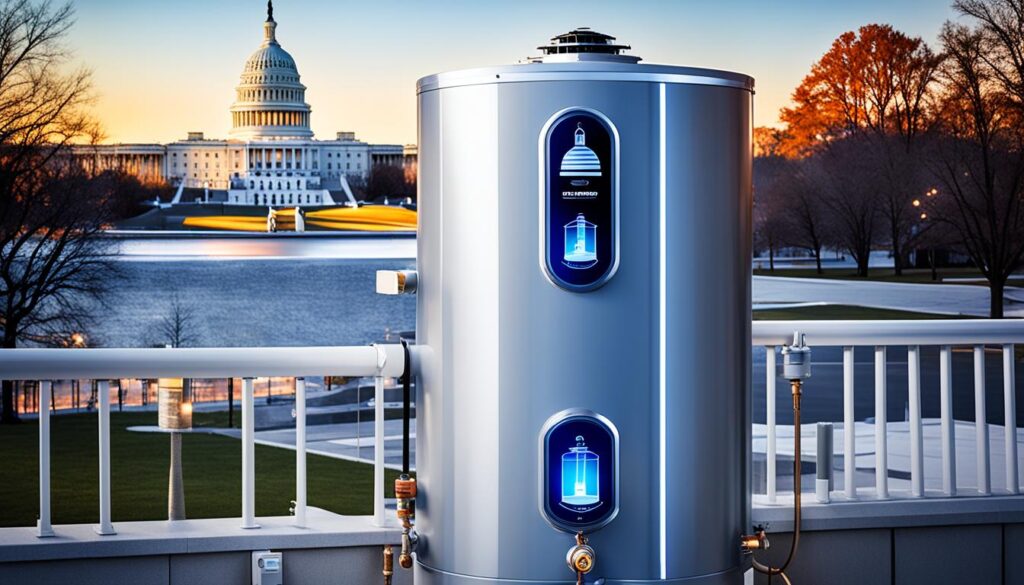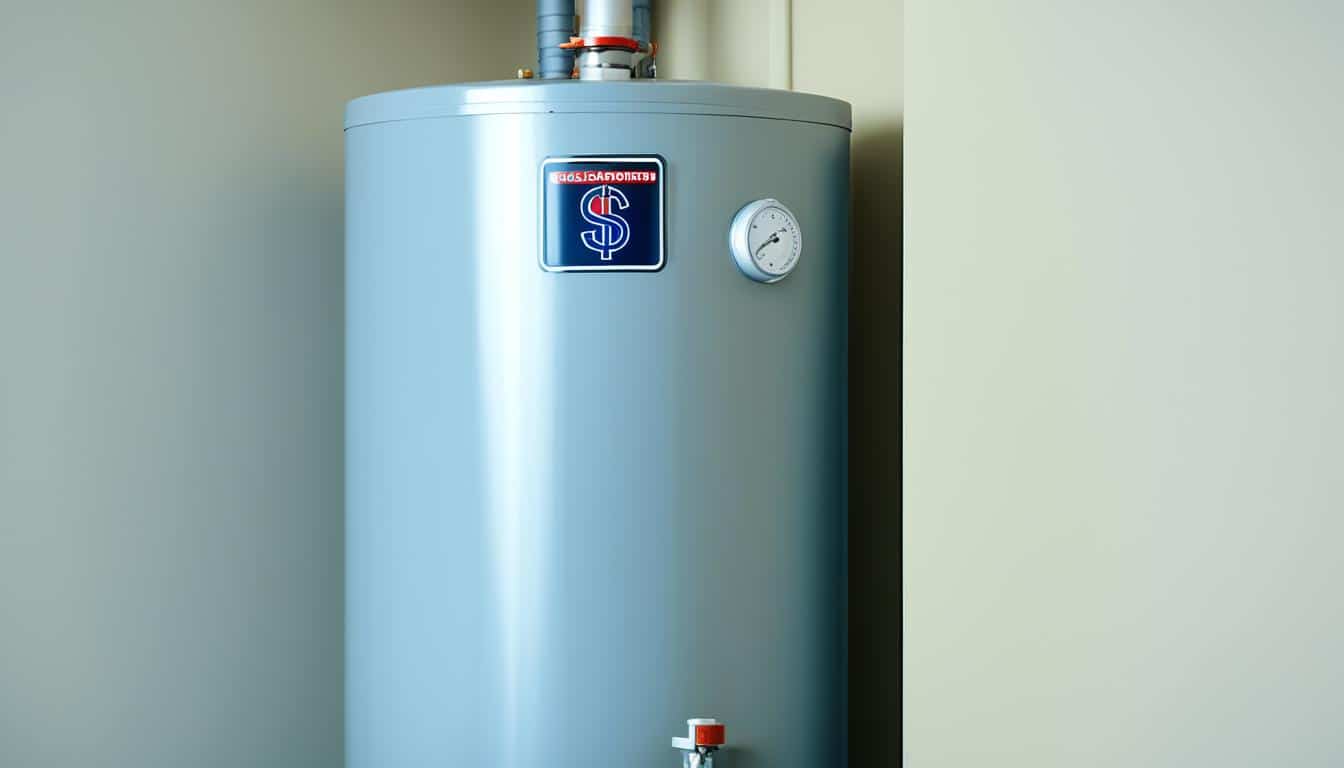People are wondering if water heaters can be tax deductible. This is due to new federal laws and the Inflation Reduction Act of 2022. These rules are very important to know because they offer tax credits from January 1, 2023, to December 31, 2032. For a water heater to qualify, it must be ENERGY STAR certified. It also must be a gas storage or tankless gas type that reaches certain energy efficiency levels.
Here’s the good part: homeowners can get back 30% of the costs, up to a certain amount each year. This amount differs depending on the kind of home upgrade but doesn’t go over $3,200 annually. To snag these federal tax credits, use IRS Form 5695. Keep in mind, these credits lower your tax bill directly, not as a refund.
It’s smart to plan your home upgrades over a few years. This way you can get the most out of these tax credits. That’s a good tip to remember.
Key Takeaways
- Tax credits for water heater installations are effective from January 1, 2023, to December 31, 2032.
- ENERGY STAR certified gas storage and tankless gas water heaters meeting UEF requirements qualify.
- Claim up to 30% of the project cost, annual limits apply.
- Use IRS Form 5695 to claim federal tax credits.
- Plan home improvements strategically to maximize tax benefits.
Understanding Federal Tax Credits for Water Heaters

Federal tax credits aim to help homeowners improve their energy efficiency. To benefit, know what qualifies and how to claim these credits. It can boost your savings significantly.
Eligible Water Heater Types
ENERGY STAR certified water heaters are the top choice. They have to meet certain energy factor requirements. This makes sure you get an appliance that saves energy while being eco-friendly.
Annual Limits on Credits
When checking IRS rules on water heater tax deductions, keep in mind the annual limits. The most you can get back is $3,200. This limit covers all eligible home energy upgrades. So, make a plan to use these tax benefits wisely.
Criteria for Eligibility
Several criteria must be met to be eligible. The water heater should be in your main home. This applies only to existing homes, not for new buildings or rentals. Also, the home should be in the U.S., in line with the nation’s energy goals. Be careful with how you claim water heater on taxes, as it involves specific rules.
If you’re looking to save money or help the planet, these credits are a great offer. Understanding the rules about eligibility and limits is key to making the most of this opportunity.
How to Claim Your Water Heater Tax Deduction
Want to get your water heater energy efficiency tax credit easily? By knowing the steps, you can make it simple and get more benefits. First off, get to know IRS Form 5695, Residential Energy Credits. This will be your main tool.
Steps to Filing IRS Form 5695
To claim your water heater’s tax benefits, take these steps:
- Download the Form: Grab IRS Form 5695 from the IRS’s site.
- Gather Documentation: Collect receipts, contractor bills, and proof of ENERGY STAR certification.
- Complete Part I: Fill in Part I of the form, focusing on the Residential Energy Efficient Property Credit.
- Complete Part II: Add other energy-saving home improvements you’ve made.
- Submit with Tax Return: Put the finished form with your tax return and send it in.
Maximizing Your Tax Credits
To get the most from your water heater tax credit, keep these tips in mind:
- Consult a Tax Professional: A tax pro can help you get all the tax breaks you’re entitled to.
- Plan Incrementally: Do home upgrades over the years to use up annual limits fully.
- Understand Credit Limits: Know that you can’t get more than what you owe in taxes back.
Stick to these steps and advice for claiming water heater tax deductions. It’ll help you save money and support a cleaner planet.
Are Water Heaters Tax Deductible?
Yes, some water heaters can be tax deductible. They must meet certain ENERGY STAR standards. This allows homeowners to get big tax breaks on efficient water heaters. It might let you claim up to 30% of the cost on your taxes, which is a lot of savings.
Choosing the right water heater can bring in tax benefits of water heaters. The IRS says you can get a tax break if your water heater meets their rules. Always look for ways to save more.
Keeping up with the IRS and tax laws, like the Inflation Reduction Act, is smart. This knowledge can improve your financial plan. Stay informed to use any credits and deductions, which helps save money in the long run.
For claiming water heater on taxes, use IRS Form 5695 correctly. Planning home upgrades smartly over time is a great strategy. This can help get the most out of recent tax changes.
- Understand which water heaters are eligible for federal tax credits for water heaters.
- Adhere to eligibility criteria and installation requirements.
- Take advantage of the tax deductions for water heaters while contributing to energy conservation.
If you’re asking, are water heaters tax deductible? Yes, but you must meet the right rules and criteria.
Conclusion
Figuring out tax deductions sounds tough, but it’s lovely for smart homeowners. Understanding the federal tax credits on energy-efficient water heaters brings big financial wins. Make sure your heater is ENERGY STAR and follows IRS rules carefully. This effort cuts your taxes and aids energy saving, a win-win.
Tax rules are always changing. Being up-to-date is key for using these savings well. Deducing the value of water heaters that fit today’s tax rules can change your tax game. Make sure you know about new laws, like the Inflation Reduction Act. Talking to tax pros is smart. They can help you use these tax breaks right, making your energy-efficient choices count.
So, are water heaters tax deductible? This question can do more than save money. It can also guide you to better energy use and financial planning. Using water heater tax credits means you’re helping the planet and managing your money better. When thinking about home upgrades, remember to check on tax savings too. Choosing tax deductions for water heaters well can really change how you see your finances through the year.








